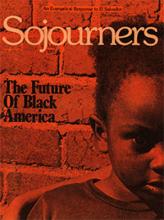In the April, 1980 Sojourners, Peter Davids examined how the people of God related to the state in the Old Testament and during the intertestamental period. He then addressed Jesus' attitude toward the state. This month Davids concludes his study, focusing on the state as it is viewed in the book of Acts, in the Haustafeln (the "tables of duty" scattered in the New Testament), and in Revelation. --The Editors
The author of Acts describes how the church dealt with governmental structures which were often hostile to the infant community. He makes three points: 1) good and righteous rulers could and should protect the church; 2) the church could use the legal system for its own protection when necessary; and 3) the church's ultimate authority is higher than any human system and thus it ignores the state law when the state attempts to restrict it from doing God's will.
First, the author makes the point that when the church is persecuted the state is acting in a capricious and unjust manner. Paul claimed that his teachings were the fulfillment of Jewish hope and thus fell within the range of options tolerated under both Jewish and Roman law. Every time a Christian was executed or Paul was imprisoned, it was due to an unjust action done to curry favor, a misunderstanding of the true facts of the case, or some similar miscarriage of justice. Whenever a Christian was fairly tried, he or she was exonerated.
Read the Full Article

